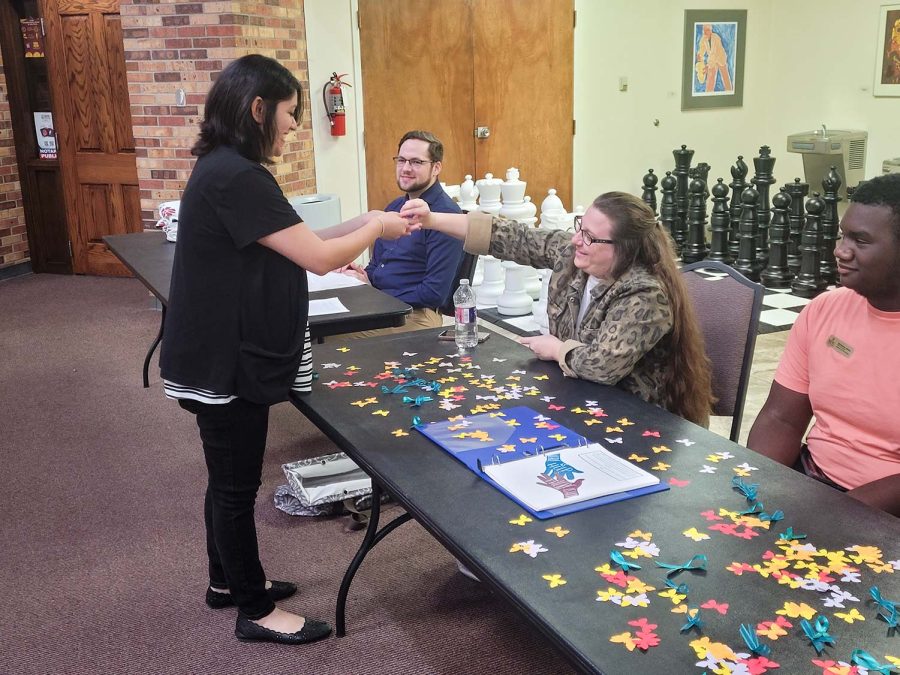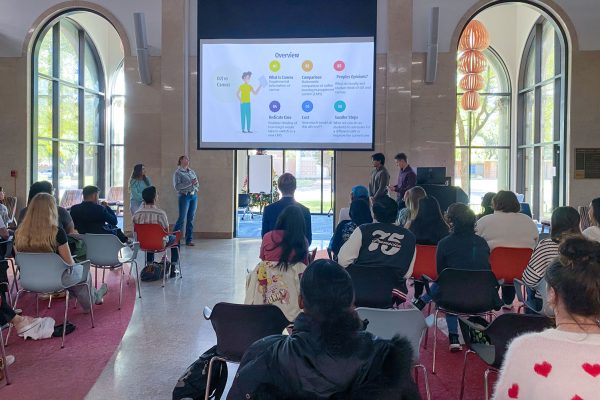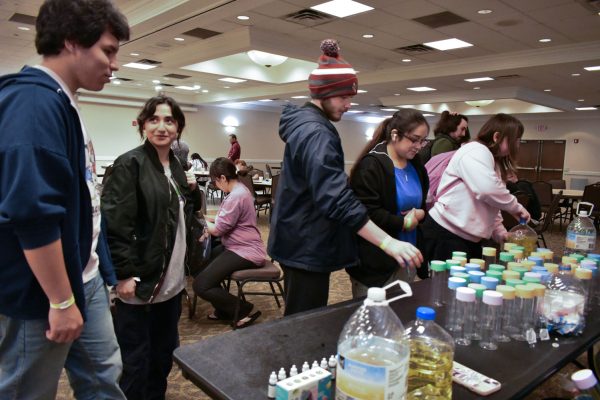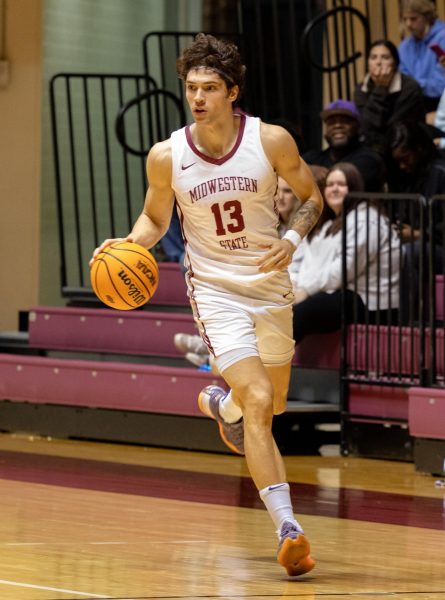Real stories provide candid look at suicide
Medical office coordinator Christina Gragg of the Counseling Center hands MOSAIC assistant director Ruby Garrett paper butterflies, Sept. 22. Gragg said she sees butterflies as a symbol of new beginnings.
Personal stories of sadness, triumph and deep pain were on display Thursday in the Clark Student Center Atrium. The stories were each united by a common thread; suicide and its impact on MSU. The stories were anonymous; their tellers are unknown, but they were part of an exhibition designed to ensure that their impact did not go unfelt.
The Share Your Stories event allows students, faculty and staff to anonymously share their experiences with how suicide has affected them. The stories are then displayed as part of an exhibition hosted by the Counseling Center.
Share Your Stories falls at the tail end of Suicide Awareness Month, a month in which the Counseling Center seeks to promote information and resources to students who may be struggling.
Counseling Center assistant direct Zachary Zoet said the overall goal of Suicide Awareness Month is to increase public understanding of the underlying issues many people face when battling depression, and provide resources to help those who are struggling.
“Part of Suicide Awareness Month at MSU is increasing the visibility of mental health in that nowadays it can be more common than it used to for persons to struggle with that just because times are a little bit challenging for students. They’re having to work more than they used to, they’re having increased financial strain, there’s greater pressure in a global market,” Zoet said.
“It’s leading to more and more persons kind of struggling,” Zoet said.
History freshman Shontavious Johnson agreed, and said the matter deserves particular attention among college students.
“I feel like it’s an important factor because it is something that happens in our age group,” Johnson said.
Suicide disproportionately affects college students, and Zoet said it is the second-leading cause of death among college students.
Andante Parker, radiology junior, echoed the importance of creating conversations centered around mental health and wellness, particularly because it can be hard to identify when people may need help.
“I think it’s very important because you never know what someone’s internally battling,” Parker said.
Zoet said what sets Share Your Stories apart is that it is not a direct resource, but rather something designed to promote conversation, learning and understanding of the impact of suicide on the campus community.
“We try to invite people to share these stories to broaden conversations, make it okay to talk about, and honor that very human struggle. So that’s the point of this exhibition, it’s just part of our Suicide Awareness Month where some parts are about empowering people to notice warning signs, some parts are about clinicians assessing students for their mental health – and other parts are that more culture-based moving the needle that we’re doing today,” Zoet said.
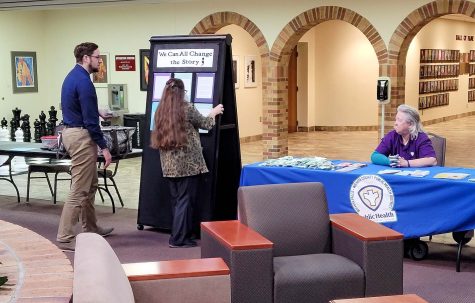
Parker agreed about the necessity of providing a platform for discussion. He said he and many other students have struggled with mental health without knowing where to go or who to talk to for help.
“I feel like it’s a big issue which a lot of people don’t speak on, which needs to be [spoken] on more,” Parker said.
Share Your Stories seeks to impart the seriousness of the topic through real stories – stories that are presented to help people grow in their understand of suicide even though it is an uncomfortable topic.
Johnson said the exhibit offers a middle ground for students who might need support but worry about the implications of seeking out help.
“It’s good that [the Counseling Center] came out to where the students actually are, because typically the students aren’t going to go out and seek that help because of the fear of being judged, maybe by peers or the people they’re reaching out to. So it’s really good that they came in and found the students directly where they are instead of the students going out and seeking it on their own,” Johnson said.
Zoet said that while suicide and depression are still real problems among college students, progress is being made. He added that some of the stigmas around talking about mental health are fading and being replaced with understanding.
“We’ve seen improvements in the visibility and destigmatization of discussing mental health concerns, but those improvements don’t come without consistent, concerted efforts to make sure that people are seen, and their human experiences are seen as human and not as negative,” Zoet said.
Still, there is more work to be done, and Zoet said that work begins as early as next week when the Counseling Center will start preparing for next year’s Suicide Awareness Month.
Zoet said Share Your Story and other events in Suicide Awareness Month have had a positive impact and reception among students – even though engaging with the exhibit can be a difficult due to its sensitive subject matter.
“People seem to very much appreciate what we’re doing, understand why we’re doing it, and also understand that these moments and these struggles are incredibly saturated and charged, and understand that what they’re engaging with is similarly moving,” Zoet said.
Students who would like more information regarding counseling or mental health help for themselves or people they know can visit the Counseling Center on campus, or call (940) 397-4618.

Hello, and thanks for stopping by! My name is Cecil Witherspoon, and I'm the new editor-in-chief of the Wichitan. I'm a mass communication senior with...



